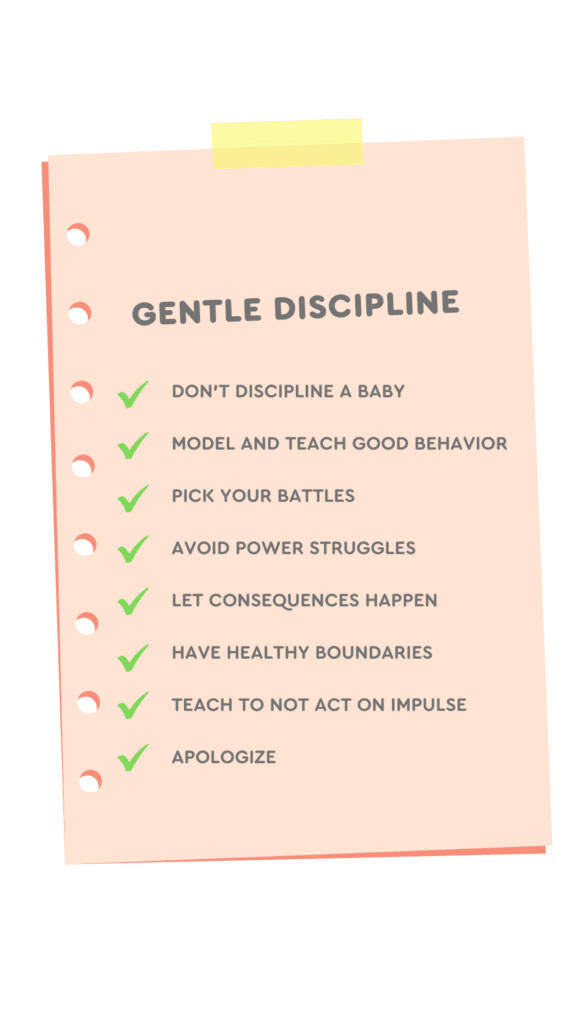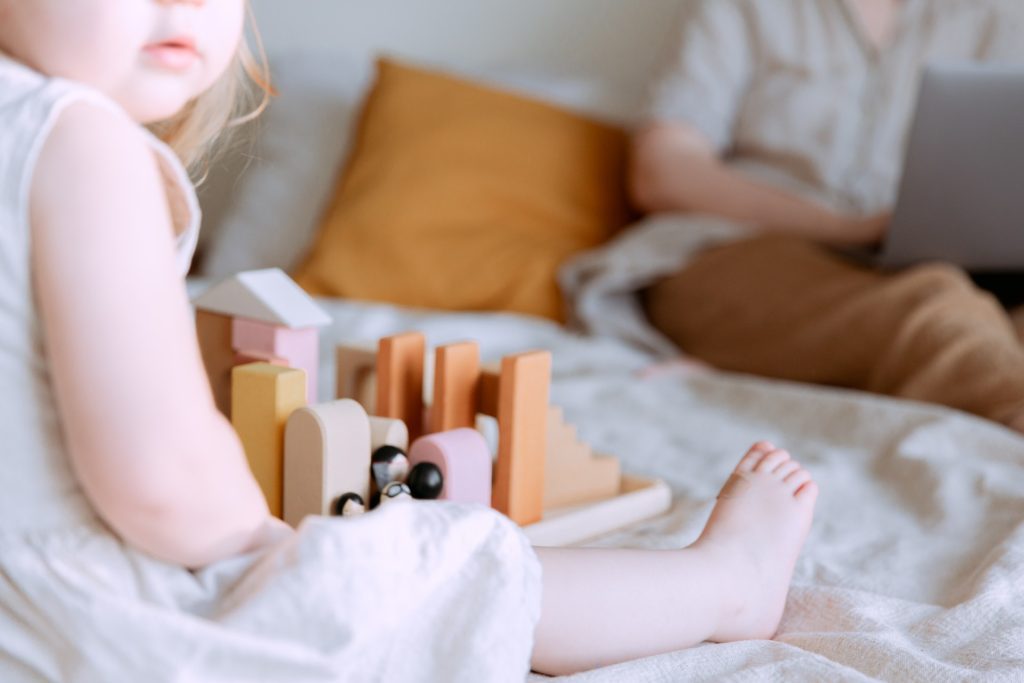
Discipline is not punishment. Discipline is loving guidance. Here are some ways in which gentle parents discipline their children.
Gentle parents don’t discipline their babies
Gentle parents spoil their babies as much as they can and forget about discipline for as long as humanly possible.
Babies don’t need discipline. Babies can’t be spoiled. They don’t need to sleep alone at night and learn not to bother their parents when they feel lonely. Just as they don’t need to learn that the fireplace is dangerous.
They need to feel loved and safe, and free to explore and play. They need to have a safe environment where they can focus on playing and understanding how the world works, and worry very little about learning safety and pleasing people. It’s okay to feel lonely, scared, upset, and ask for the support of the people that they love, and that is true for every person of every age, gender, shape, color, and flavor.
Gentle parents model and teach
When babies become toddlers, they start knowing what they want and how they want it. But they need to learn what they can and can’t do, how to express themselves in an appropriate way.
We could let them be and correct them when they misbehave, but that is going to make them see themselves in a negative light, isn’t it? Instead, gentle discipline is about modeling and teaching the behavior that we want.
For example, we want our children to be gentle with their little siblings. So we model for them how a gentle touch looks, and we teach them by holding their hands and help them gently touch their baby sibling.
Gentle parents pick their battles
Gentle parents probably have a hard time with confrontation. Or maybe it’s just me. Parenting lovingly and mindfully is not easy. It’s a little tiring, mentally and emotionally. And there are definitely battles that are not worth fighting.
Reading ten books before bed is not really a problem. If your kid doesn’t want to wear a shell when it’s raining, they will get wet and learn, they are not going to die.
On the other hand, some things are non-negotiable: wearing a helmet on a bike, alcohol is for adults, we don’t run into traffic, and so on. These we NEVER question. Kids get the message, and never question them themselves.
Gentle discipline is recognizing what expectations are appropriate for each child. We want our kids to take us seriously when we establish some boundaries. And we do this in two ways: we don’t ask more than it’s reasonable and we don’t ask more than they are capable of.
This means we don’t ask a kid to be still and quiet for a very long time, that is not natural. We don’t make them wear a tidy well-matched outfit every day to go to school if they don’t want to. That is our arbitrary preference.

Gentle parents avoid power struggles
“Because I say so” is not a good enough reason. When someone says this they usually mean “I’m right and you’re wrong, I’m big and you’re small, and there’s nothing you can do about it.”.
Hopefully, we are making good decisions for the right reasons. This means that when a child asks why, there is a good logical answer that they will probably accept. They are still going to push boundaries, and that is OK. Then we can help them learn how much they can actually push them.
Being flexible will make them more resilient and likable, and those are definitely two good traits to have. Therefore, gentle parents lead by example by being flexible with their own expectations.
Also, parents being very firm with boundaries will teach kids to be very firm with their own boundaries.
Gentle parents let natural consequences happen
We are trying to make decisions based on logic, right? If you jump in a puddle you are going to get wet. Sometimes the best way to learn something is by making a mistake. We can just let them make mistakes that don’t pose too much risk to their safety or emotional wellbeing and let them learn. They will learn what the natural consequence of that mistake is by just letting consequences happen.
Sometimes natural consequences are not an option, and we still want to stop a behavior. In that case, we can create a logical consequence. For example, if a toddler is running around and there are cars around, we could ask them to stop, but we can’t let them learn by themselves. A natural consequence would be to get run over. We can keep them close enough so that we can ensure their safety, and if they keep trying to run away, they need to be holding our hand or sitting in the stroller. That is a logical consequence.
Upsetting you is also a reasonable natural consequence of their actions. They are going to learn that when they cross a boundary mom is upset, probably not as playful for a while, but equally sweet and kind. Peaceful parents have a right to be upset too, but they try not to be harsh and unkind when they are.

Gentle parents have healthy boundaries
If we didn’t have boundaries, we wouldn’t be teaching much. And discipline is teaching. Everyone needs boundaries. Children especially need them to feel that they are taken care of. Parents are in control and are not going to let things go out of hand.
Some things are so incredibly important that we can’t let them have the freedom of messing up. We are not going to let them run into traffic. We won’t yell “Come close to me!” while they are about to do so. They can learn about safety without being in actual danger. We are going to keep them close enough to be able to physically stop them from being in serious danger. What are we teaching them if we say safety is not negotiable but we still let them be responsible for it when they are not ready?
Some things they need to learn but are so important that we can’t let them go, not one time. In my family, hitting is not acceptable ever. Of course it’s not, everyone thinks like that. Usually, if it happens is when someone’s space has been invaded, so we make an extra effort to avoid those situations. Parents see the future. If we pay attention, we can offer alternatives. If it still happens, even if no one gets hurt, then we are going to have a talk about it. They are going to find a way to make things better, and then we will move on.

Gentle parents teach their kids to not act on impulse
Not having rules is terrible. We all need to think before we act. We can be flexible and still have rules. Some rules we have for the purpose of learning to have rules.
We take our shoes off when we are inside. Is something terrible going to happen if we wear shoes inside? No. But we need to teach ourselves to stop and think, every time we enter the house, to take our shoes off. It’s not an incredibly obvious boundary, but it’s still a rule.
In our home, we all sleep together in the same room. Because of this, we have the rule that when it’s time to go to bed we talk quietly. If not, then we go somewhere else. This helps them think: “I’m in the sleeping room now, and we are about to go to bed, so I need to speak in a quiet voice”. This will translate to “I’m in a public space now, I need to be mindful of other people, I can’t be playing music loudly”. Is it really all that important to speak quietly in the sleeping room? Nah.
Does this contradict what I just said about not asking arbitrary things? I don’t think so. When I say rules I mean something that has been talked about and explained beforehand. Not some arbitrary demand that an adult has made in the moment.
Gentle parents apologize
Nobody is perfect, everyone makes mistakes. It’s OK, you just have to apologize without excuses, make things better, and do better next time. Apologizing is not going to make you fall off your pedestal. If anything, it will make you look even better.
Little kids may not notice if you make a mistake, you could create a believable excuse and move on. They think you are the most amazing human being. They’re not as smart as you are. You could manipulate them into thinking you were right and they were wrong. But that would not be right.
They have an intuition that they need to cultivate and value. If you did something wrong and didn’t apologize, they will doubt themselves.
An example of gentle discipline
A toddler has been throwing a toy many times and is being destructive. Here is how to use gentle discipline.
You have thrown this many times and it’s getting a little out of hand, don’t you think? We don’t want to break it. Let’s put this back and find something else to play with. I see you want to throw things. You can throw this pillow instead.
This way they know that we don’t want to be destructive. They understand why you are asking them to put the toy away, they probably agree. You are not trying to make them feel bad, you are offering a solution to a problem.
Say they don’t agree with you, and want to keep playing with the toy. Maybe they come up with another solution, like being more careful from now on, that is fine too. If they are still being destructive, you could let the natural consequence happen. If you don’t want to let them break the toy, you can create a logical consequence.
OK, you can keep playing with it but you have to be more careful. If you throw it one more time I’m going to put it away and you will play with it when you learn how to be careful.
Here are some ideas on how to handle tantrums and meltdowns in a peaceful way.
This post may have some affiliate links. This means if you click on the link and purchase the item, I will receive a commission at no extra cost to you. All opinions are my own.